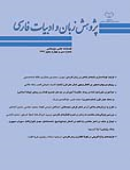تأثير حافظ در ادبيات مجاري
محورهای موضوعی : پژوهشهای ادبیات کلاسیک ایران
کلید واژه: حافظ زبان مجاري,
چکیده مقاله :
حافظ، نمايندهي اوج اعجاز زبان فارسي است. شعر او، حكايتگر وسعت روح آدمي و نماد ژرفايي و پرمعنايي زيست اوست كه از عشق و صدق تعليم گرفته است؛ ازاينرو، هرچند تعابير چند وجهي و شبكهي درهمتنيدهي موسيقي لفظي و معنوي كلامش، قابل ترجمان نيست ولي رنگ آشناي دنياي او را هر انسان انديشمندي درمييابد و ميپسندد و شيفتهوار قدم به جهان برساختهي او مينهد. اروپائيان از قرن هفدهم ميلادي با ادبيات فارسي آشنا شدند. زمينهساز اين آشنايي ترجمهي اشعار فردوسي، حافظ، خيام و سعدي به زبانهاي غربي بود. مردم مجارستان، نخستين بار به سال 1771م. به همت كرولي رويتسكي سفير امپراتوري اتريشـ مجارستان در خاورميانه، حافظ و اشعار وي را شناختند. اشعاري كه رويتسكي از ديوان حافظ برگزيده بود، مورد توجه شاعران و اديبان مجاري قرار گرفت. پس از رويتسكي، چند نفر ديگر از اديبان مجاري كه با زبان و ادب فارسي آشنايي يافتند، بخش ديگري از غزليات حافظ را در فاصلهي قرن هجدهم تا سالهاي اخير ترجمه كردند. اين ترجمهها، گاه در مجموعههاي مستقل و گاه در جُنگهايي همراه با ترجمهي اشعار ديگر شاعران ايراني و حتي شرقي منتشر شدهاند. در اين مقاله، براي نخستين بار در ايران به ترجمهي شعر حافظ در ادبيات مجاري پرداخته ميشود.
Hafiz is the representative of the pick of the literary masterpieces of Persian language which sounds like a miracle. His poetry, which is based on the teachings of love and truth, is the reflection of infiniteness of the soul, and the symbol of the depth and meaningfulness of the human’s life. Hence, the familiar color of Hafiz’ poetry is comprehensible and loved by any sophisticated person, though the harmoniously interwoven net of its form and content does not lend itself to translation. The Europeans got to know the Persian language since the 17th century. Its background had already been provided by translations of Firdausi, Hafiz, Khayyam, and Sa’di. Hungarians became familiar with Hafiz first through Karoly Roytski’s translation in 1771. He was the ambassador of Austria-Hungary Empire to the Middle-East. The poems Roytski translated attracted the attentions of most Hungarian poets and literati. Since then other parts of Hafez have been translated by Hungarian translators from Persian language. Some published as books; Some entered in complexes among the translations of other Iranian or Eastern poets. It is the first time in Iran that a publication is dedicated to the study of the translation of Hafiz in Hungarian language.

